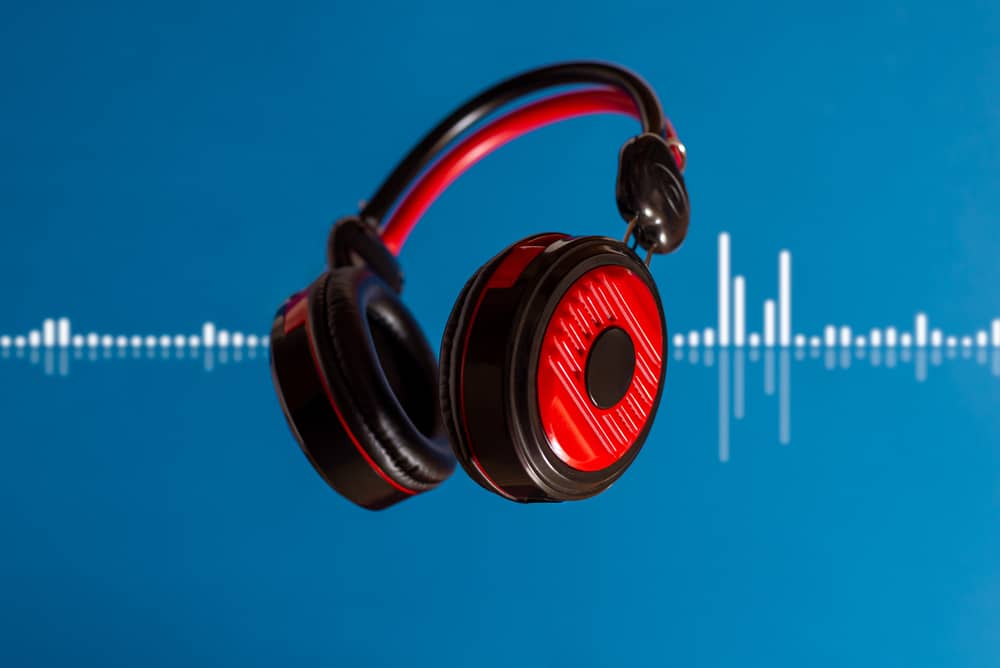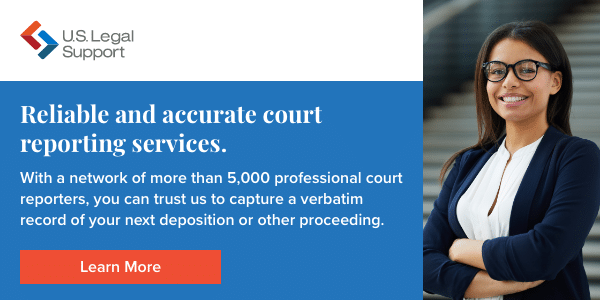Transcription for Lawyers: Why It’s Important

What do music composers, biochemists, and lawyers have in common? All three professions rely on transcription—an accurate capture of either musical notes, DNA nucleotides, or spoken words.
The classic definition of transcription refers to both the process and end product of textual representation and/or translation of speech sounds. For the legal profession, the documents created by legal transcriptionists and court reporters are the gold standard.
So, why are professionals needed to convert speech to text, and what makes transcription for lawyers so important? Let’s dive in.
Why Lawyers Need Transcription Services
While they may not seem like a natural pairing, law, and poetry share a critical likeness: every written word and character is vitally important. A comma out of place can change the nature of a written contract (or sonnet), so careful review and editing is a crucial step.
Lawyers also need a method to apply that level of specificity and control to information that’s created or collected orally. There are five (progressively more accurate) ways to make up for our human lack of absolute recall. You can revisit oral testimony through:
- Memory
- Short-hand notes, either your own or a team member’s
- Audio or audiovisual recordings
- Professional transcription of such recordings
- Realtime transcription during live events
Professional and realtime transcription are commonly used to capture accurate records of spoken testimony or exchanges. Here’s why:
Challenges of Capturing Oral Testimony
Once you introduce spoken testimony to the mix, there’s a much larger margin of error in creating accurate records, whether from live events or from audio and video recordings. Oral testimony, discussions, and decisions can lead to errors based on:
- The limits and subjectivity of individual memory
- Reliance on meeting notes that are incomplete, illegible, or confusing after the fact
- Speakers mumbling, turning away, or otherwise obfuscating their audiovisual capture
- Background noises and overlapping speech
Types of Transcription
Legal transcription typically refers to the process of converting recorded files to text with the use of a standard keyboard and a foot pedal or other mechanism to stop, start, fast-forward, and rewind the recording.
Realtime transcription, on the other hand, uses short-hand methodology through a stenotype machine or a stenomask (or court reporting equipment and software) to capture speech as it occurs.
To weigh their efficacy, let’s look at three categories of numbers: speaking speed, typing speed, and realtime stenographic transcription speed.
- Speed of speech:
- 180 – 250 WPM: Average English speaker1
- 200 – 350 WPM: Fast English speaker
- Typing speeds:
- 41 WPM: Average computer keyboard typing speed2
- 65 – 75 WPM: Range for highly skilled typists3
- 170.7 WPM: Qualifying speed for top 25 contestants in Das Keyboard’s worldwide 2020 Ultimate Typing Championship4
- Speeds for realtime transcription:
- 160 – 260 WPM: Minimum National Court Reporters Association (NCRA) certification speeds5,6,7
- 225 – 360 WPM: Highly skilled realtime transcriptionists1
The Use of Technology
It’s natural to wonder why the human element—a trained transcriptionist—is still superior to relying on technology. Wouldn’t the use of transcription software and high-quality recording equipment be more efficient in generating verbatim records, without the margin of human error?
Not quite. The answer is in combining the two. Realtime transcriptionists employ equipment that incorporates back-up audio recordings to consult later if necessary, as well as AI-aided software that converts shorthand input to a text draft to be reviewed and corrected.
Whether through playback or live, a skilled professional can:
- Employ familiarity with legal terminology that is difficult to interpret
- Untangle the audio chaos of multiple individuals speaking over each other
- Request speakers clarify with speech
Benefits of Accurate Legal Transcriptions
While ‘benefits’ sounds like extra bonus features, the following characteristics of using professional transcriptionists at depositions and other proceedings aren’t frills. For a lawyer, transcription is the only way to obtain:
Searchable Text
Imagine using a search engine that limited information to a top category. Instead of searching for the cost of an annual family pass to a nearby zoo, for instance, you’d have to simply start at “Zoo” and scan through pages of text on the history, controversies, special events, funding, and all the other not-so-useful data before arriving at the specific fact you’re looking for.
Building a legal case includes finding important pieces of information and how they connect in sequence to case law and to support an argument. To do that efficiently, you need electronic transcripts of depositions and other proceedings that can be:
- Easily viewed, indexed, and searched
- Annotated and tagged
- Shared with colleagues, relevant parties, opposing counsel, or subsequent counsel if a case changes legal representation
Relying on memory, notes, and repeated viewings of audiovisual recordings can’t compare to having quick-turn access to verbatim transcripts with these functions.
Verbatim Records
A legal verbatim transcription is the pinnacle of accuracy. Also called true, strict, or full verbatim, it captures every pause, stutter, repeated word, and nonverbal sound made by a speaker.
All of those ‘um’s and coughs and sighs can be critical to a legal transcript to:
- Illustrate a witness’s emotional state or level of recall without subjective commentary
- Underline the level of accuracy employed throughout the transcript
- Qualify as the highest standard of legal record
In addition to an absolutely accurate record of oral testimony, a verbatim record will identify each speaker and may make a note of background noises.
A Courtroom Requirement
Any video or audio recording intended for use at trial or in a formal court proceeding requires an accompanying certified transcript.8 The transcript is entered along with the recording as:
- Replacement for an unavailable deposed witness
- The basis to impeach a witness
- An evidentiary exhibit
As such, they become part of the official trial transcript and are available for use to:
- Appeal judgments
- Retry cases
- Support future case law
When Lawyers Need Transcription Services
We’ve explored the why of lawyer transcription needs, but do you know which events or occasions in the legal field benefit from securing your own transcriber?
Depositions
Each legal case can produce multiple witness depositions during discovery. With only 3% – 6% of criminal cases and 5% of civil lawsuits actually going to trial, depositions vastly outnumber trials and generate the most frequent need for transcription in many law firms.9,10
Courtroom Proceedings
A formal record is required for any courtroom proceeding that involves a judge, jury, or magistrate.
Although court reporters are typically engaged to capture verbatim speech, some states and jurisdictions allow audiovisual recording without a transcribing court reporter present. They may also limit the transcription of recordings to be produced only if a lawyer requests and purchases it.
A law firm may need a professional to transcribe:
- The courtroom audiovisual recording in the absence of an official transcript
- Your own team’s back-up or focused audio or video recording
- The courtroom recording if you need a faster turnaround than available from the attending court reporter
Formal Meetings
Between depositions and jury trials are a host of meetings that require an official record. You may need either realtime transcription or legal transcription of an audio file for:
- Settlement negotiations
- Any meeting that impacts the outcome of a pending lawsuit or criminal case
- Discussions relevant to contract negotiations and details
- Meetings that lawfully require a formal record, such as a board of directors
- Public hearings
- Meetings that lead toward the dismissal of individuals with executive contracts or tenure
Legal Dictation
For lawyers that rely on audio recording notes, memos, letters, and other drafts, a legal transcriptionist provides an efficient turnaround for creating a written copy.
Transcript Review
A legal transcriptionist can also perform a transcript review. This may entail:
- Identifying errors when compared to an original recording
- Partnering with court reporters to review and finalize stenographic records
- Correcting terminology, formatting, and abbreviations from a rough transcript
Partner with the Leader in Transcription Services
U.S. Legal Support has been in the business of providing skilled and reliable transcription services since 1996.
At center stage is our network of 5,000+ transcriptionists and court reporters across the nation. We can connect you with professionals who utilize stenography, voice writing, and digital reporting to capture verbatim records. We can also produce an accurate transcript of any audio or visual file.
U.S. Legal Support also offers litigation consulting and trial services, interpreting and translation services, record retrieval and analysis, and more.
Ready to learn more about our legal support services? Contact us by phone, email, or website request form for your immediate transcriptionist needs or to discuss how we can help with your overall litigation support needs.
Sources:
- Stanley Sakai. Stan’s Quick and Dirty: How Stenography Works. https://youtu.be/62l64Acfidc
- Ratatype. Average typing speed infographic. https://www.ratatype.com/learn/average-typing-speed/
- Rev.com. The Subtle But Significant Difference Between Typist, Transcriptionist, and Stenographer. https://www.rev.com/blog/productivity/difference-typist-transcriptionist-stenographer
- Das Keyboard. The Fastest Typist in the World Wins the Ultimate Typing Championship. https://www.daskeyboard.com/blog/the-fastest-typist-in-the-world-wins-the-ultimate-typing-championship/
- National Court Reporters Association. Registered Merit Reporter (RMR). https://www.ncra.org/certification/NCRA-Certifications/registered-merit-reporter
- National Court Reporters Association. Registered Professional Reporter (RPR). https://www.ncra.org/certification/NCRA-Certifications/registered-professional-reporter
- National Court Reporters Association. Registered Skilled Reporter (RSR). https://www.ncra.org/certification/NCRA-Certifications/registered-skilled-reporter-(rsr)
- Cornell Law School. Rule 32. Using Depositions in Court Proceedings. https://www.law.cornell.edu/rules/frcp/rule_32
- The Outline. Most criminal cases end in plea bargains, not trials. https://theoutline.com/post/2066/most-criminal-cases-end-in-plea-bargains-not-trials
- The Law Dictionary. What Percentage of Lawsuits Settle Before Trial? What Are Some Statistics on Personal Injury Settlements? https://thelawdictionary.org/article/what-percentage-of-lawsuits-settle-before-trial-what-are-some-statistics-on-personal-injury-settlements/

Editoral Policy
Content published on the U.S. Legal Support blog is reviewed by professionals in the legal and litigation support services field to help ensure accurate information. The information provided in this blog is for informational purposes only and should not be construed as legal advice for attorneys or clients.


